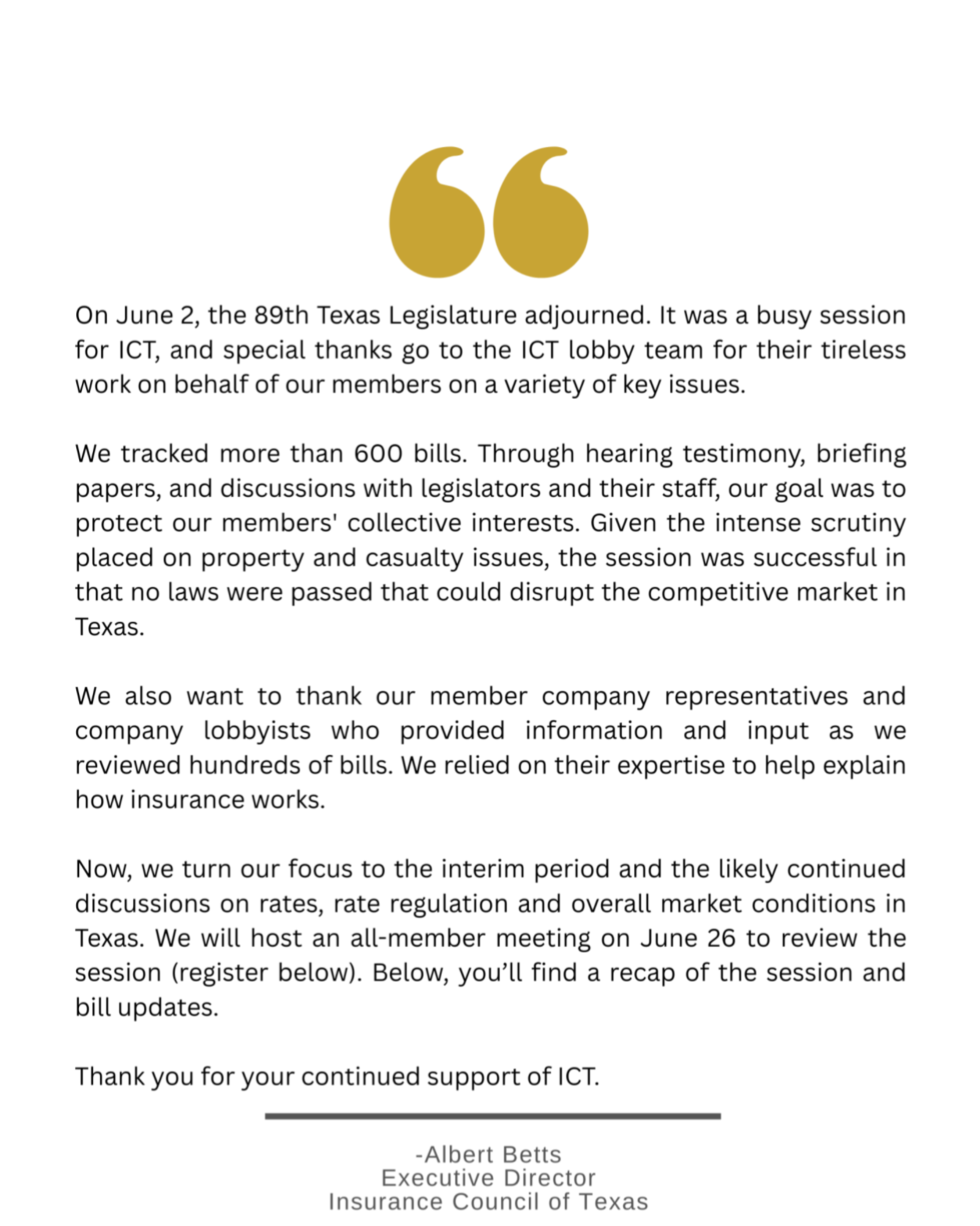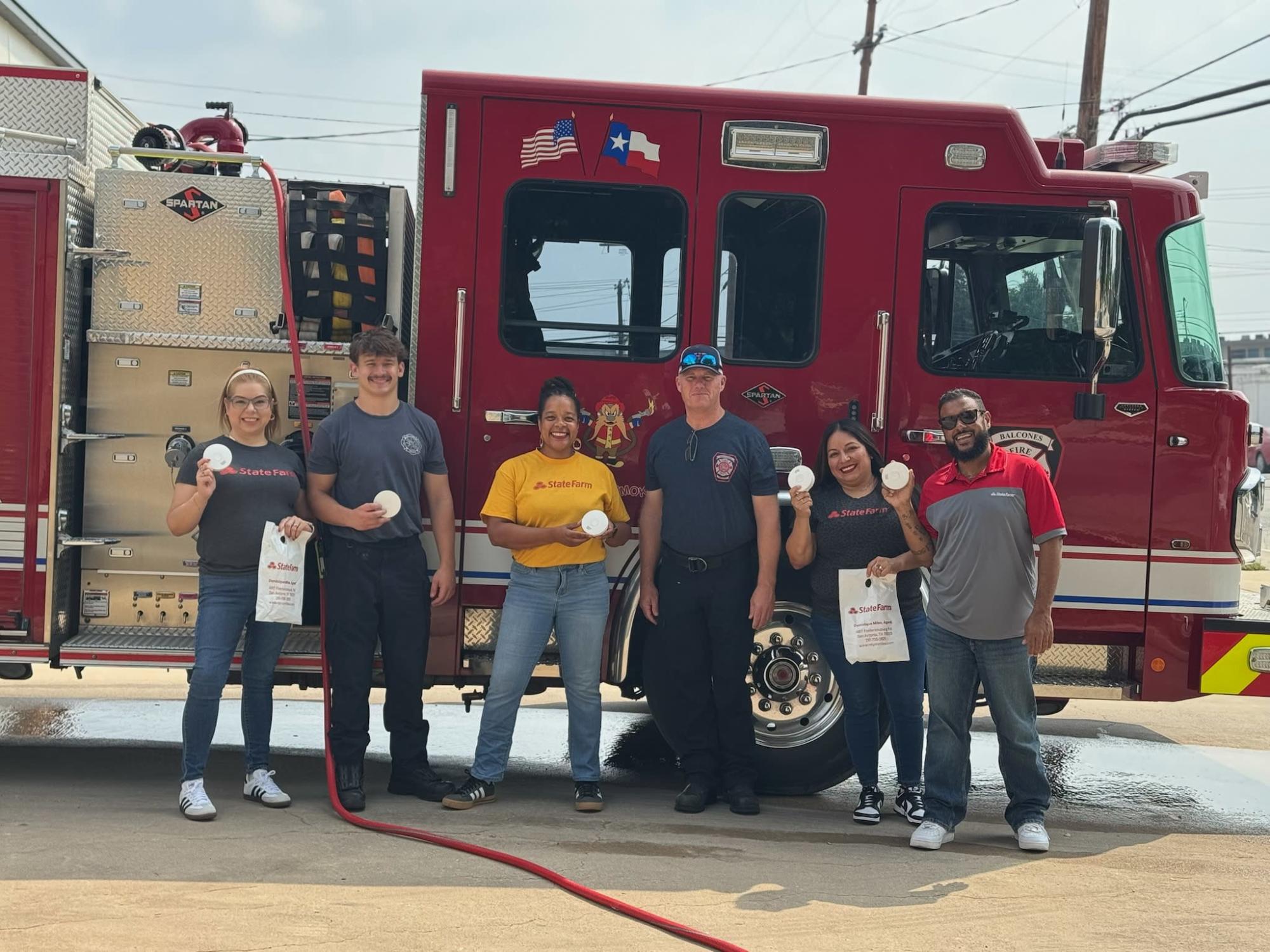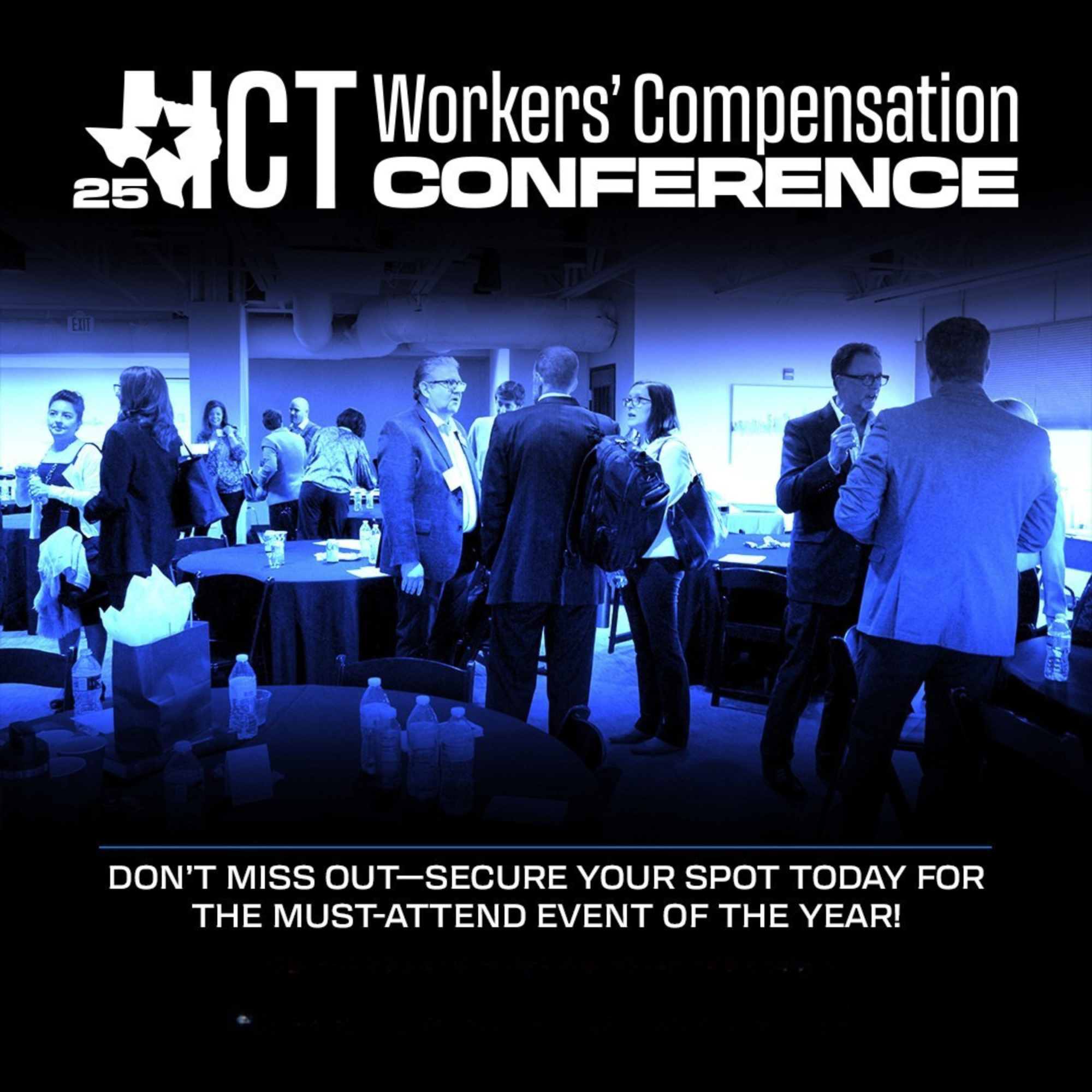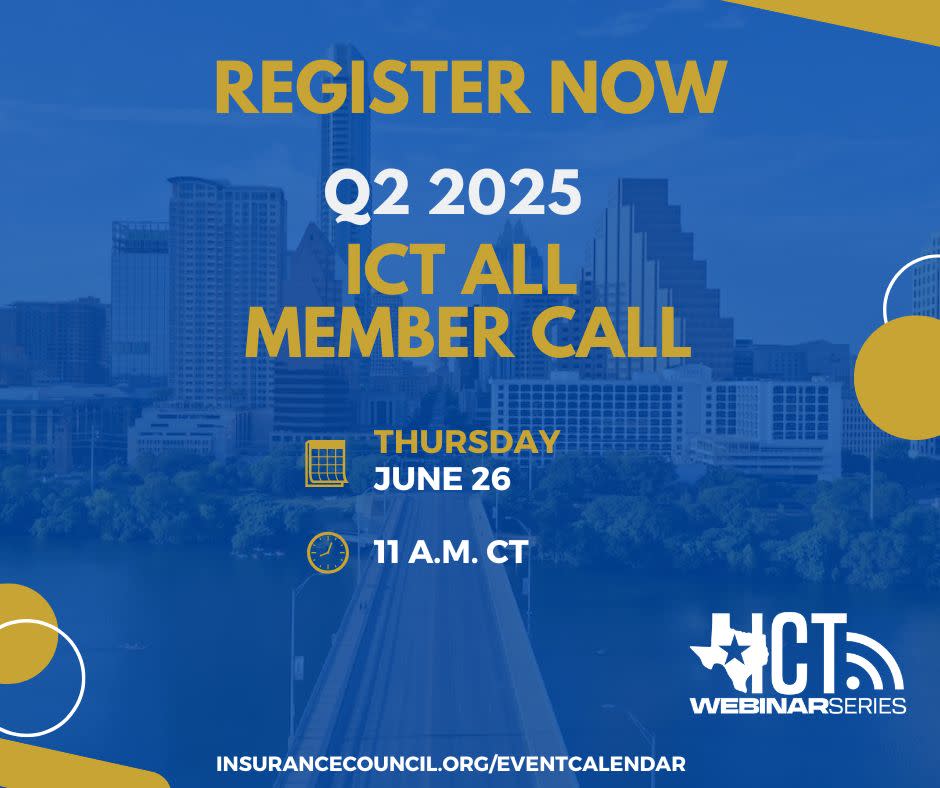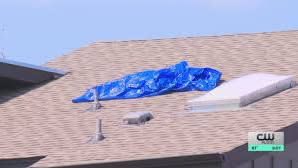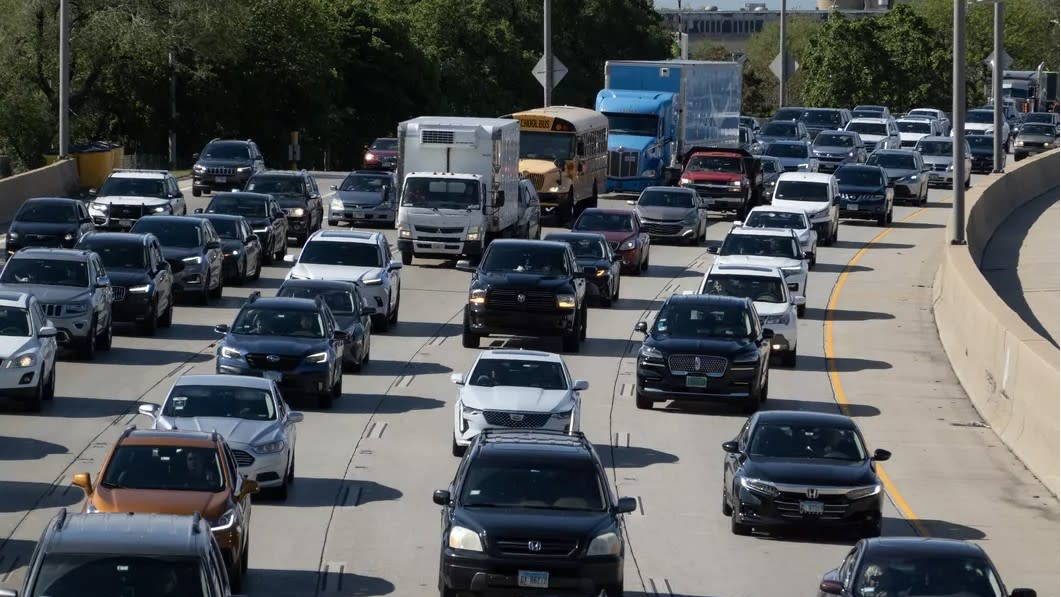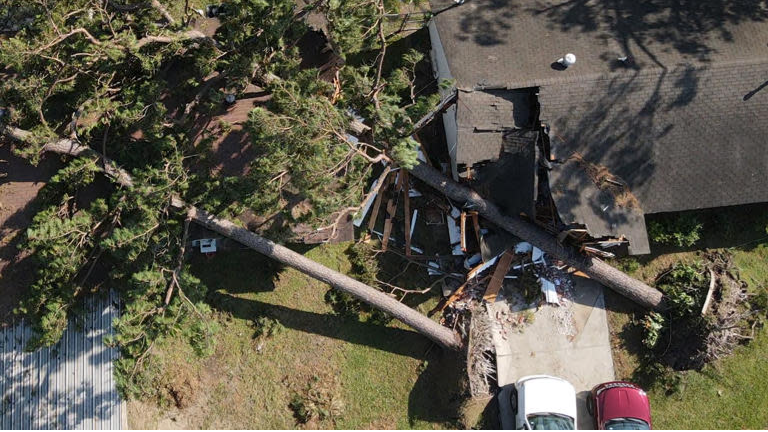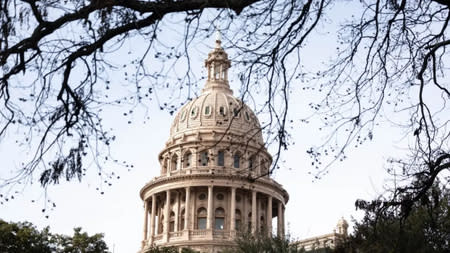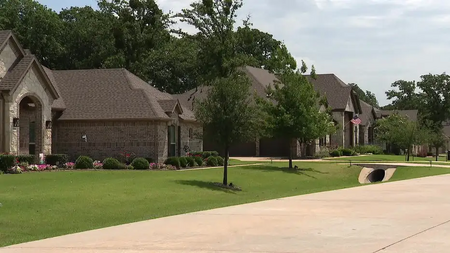Good afternoon!
For the latest updates from ICT in the insurance industry, follow us on LinkedIn and make sure to enable notifications 🔔
For more Texas-related P&C insurance information and news, visit the ICT website
|
|
A Look Back at the 89th Texas Legislature
ICT Tracks More than 600 Bills
|
Final Week Conference Committee Updates
|
As of the beginning of the week, several important ICT-priority bills were under review in conference committees. The following summarizes their outcomes.
- HB 2067 (Paul/Middleton) – Reasons for Nonrenewal, Cancellation, and Declination
This bill implements TDI’s biennial recommendation aimed at increasing consumer transparency by requiring insurers to submit reasons for nonrenewals, cancellations, and declinations. ICT worked closely with Rep. Paul to shape a more reasonable version, which passed the House with generally acceptable language.
The Senate version included concerning changes: an earlier effective date of Sept. 1, 2025, a vague amendment on protecting proprietary data, and the reintroduction of workers’ compensation, which had been removed by the House.
Rep. Paul rejected the Senate amendments and sent the bill to a conference committee. The final version, adopted May 31, reflects a more balanced approach. It includes the House’s aggregate ZIP code reporting standard with safeguards against identifying specific insurers, statewide (not ZIP-level) reporting for workers’ compensation, and a compromised effective date of Jan. 1, 2026.
- HB 145 (King/Schwertner) – Wildfire Utility Immunity
This bill establishes liability protections for utilities facing wildfire-related damage claims. Utilities may either self-insure or submit a wildfire mitigation plan to the Public Utility Commission. If the plan is approved, implemented, and followed—without the utility acting intentionally, recklessly, or negligently—the utility may be shielded from liability.
The bill went to conference committee, and the final version, adopted May 31, retained the protection framework and clarified the criteria for acceptable mitigation plans, giving utilities a path to limit liability while promoting wildfire risk management.
- SB 30 (Schwertner/Bonnen) – TLR Litigation Reform
This bill proposed changes to the Texas Civil Practice and Remedies Code related to the recovery of non-economic damages and evidentiary rules for economic damages. After multiple revisions, the House significantly altered the bill, softening its impact by removing restrictions tied to health care billing codes and changing itemization and privacy provisions
The Senate sought to strip those changes in conference, but negotiations broke down, and the bill died in committee.
Outcome of Key Issues
Regulatory Reform Bills Defeated
A major concern this session was a series of broad regulatory reform bills that could have significantly altered how property and casualty insurance is regulated in Texas. SB 1642 and SB 1643, filed by Senate Business & Commerce Chair Charles Schwertner, would have created a three-member commission to oversee TDI and imposed prior approval for rate changes exceeding ±10%.
Although described early on as “conversation starters,” both bills reached the House and were heard in the House Insurance Committee on May 20, sponsored by Chair Jay Dean. This followed an April 30 hearing on HB 5519 by Rep. Trey Martinez Fischer, which proposed an even stricter ±5% prior approval threshold.
At both hearings, lawmakers voiced serious concerns and indicated they were not ready for such sweeping changes without further study. Ultimately, none of the proposals passed.
Appraisal
SB 458 (Schwertner/Dean) – Sent to the governor May 28
Requires personal auto and residential property policies to include a binding appraisal clause—except in cases of fraud or mistake—while allowing insurers to keep existing policy forms. The bill reflects a carefully negotiated compromise with broad stakeholder input and gives TDI rulemaking authority. The House version clarified that appraisal awards must comply substantially with the appraisal clause (not the full policy) and delayed implementation for existing forms to Jan. 1, 2026. The Senate concurred May 26.
TWIA
HB 3689 (Hunter/Kolkhorst) – Sent to the governor June 2
Revises the Texas Windstorm Insurance Association (TWIA)’s funding structure by eliminating debt layers and authorizing the Texas Comptroller to provide up to $1 billion annually (or $2 billion total) for pre-event and post-event TWIA funding. Funds are repaid through surcharges on property policies, with insurer disclosure of surcharge amounts.
The Senate amended the bill to:
- Remove a provision repealing insurer assessments for excess reinsurance, and
- Change the statutory probable maximum loss (PML) from a 1-in-100-year to a 1-in-50-year benchmark.
These changes were drawn from SB 2530 (Middleton). The House concurred in the Senate amendments. Still, HB 3689 passed in a form that avoided more problematic alternatives. It advanced in place of:
- SB 2530 (Middleton) – Would have tied member assessments to TWIA’s PML growth. With a 50% increase in PML from 2021–2026, 2026 assessments could have reached $1.5 billion.
- SB 2571 (Middleton) – Would have set member assessments at one-third of total TWIA funding at the 1-in-100-year PML level (e.g., $2 billion in 2025).
AI Regulation
HB 149 (Capriglione/Schwertner) – Sent to the governor June 2
Establishes new regulations for the use of artificial intelligence. ICT had concerns about potential conflicts with the Texas Insurance Code and worked with Chair Capriglione to revise the bill. The final version includes language recommended by ICT and industry partners to clarify that general discrimination standards don’t override insurance-specific statutes. It also preserves the Insurance Commissioner’s regulatory authority.
Litigation Reform
In addition to SB 30, other litigation reform bills failed:
- SB 39 (Birdwell/Leach) – Addressed commercial vehicle liability and bifurcation rules. Died in House Judiciary and Civil Jurisprudence.
- SB 2978 (Hancock) – Sought to clarify pre-suit notice requirements under Insurance Code Chapter 542A. No Senate hearing.
Wildfire Response
SB 868 and SB 34 (Sparks) passed without increasing insurer assessments. Early versions proposed uncapping or raising the current $30 million cap to $40 million. ICT worked with Sen. Sparks early in the session to explain the downstream cost burden on policyholders. The final versions retained the $30 million cap.
OPIC Biennial Recommendation
SB 1644 (Schwertner/Smithee) – Sent to the governor June 1
Implements OPIC’s recommendation to update CBIS at least every three years. ICT worked to refine the bill language but a concern over federal preemption of adverse action notices was not resolved in the final version.
Other Notable Bills That Passed
- SB 1238 (Kolkhorst/Morgan) – Bars insurers from denying or limiting coverage or charging different rates solely because someone is widowed. Signed May 20, effective Sept. 1, 2025.
- SB 213 (West/Dean) – Prohibits tying. Sent to governor May 28, effective Sept. 1, 2025.
- SB 1151 (Blanco/Wharton) – Removes on-site audit requirements for third-party administrators in workers’ comp. Signed May 19, effective Sept. 1, 2025.
- SB 455 (Middleton/Morgan) – Surplus lines arbitration reform. Filed without signature, effective Sept. 1, 2025.
- SB 264 (Perry/Button) – Eliminates the self-insurance group guaranty fund under workers’ comp law. Sent to governor May 27.
- HB 2488 (Bell/Alvarado) – Allows remote contested case hearings (CCHs) under DWC rules. Sent May 31, immediate effect.
- HB 3388 (Paul/Middleton) – Authorizes “group” property and casualty insurance structures. Sent May 31, immediate effect.
Outcome of ICT Initiatives
- HB 4877 (Paul/Zaffirini) – An ICT-initiated cleanup of statutory provisions related to TPCIGA. Despite support from its Senate sponsor, Senator Zaffirini, and repeated requests for a hearing, the bill was never scheduled in Senate Business & Commerce.
- HB 4401 (Vo) – Would have moved MVCPA fee and enforcement functions to the Comptroller. Died on the House calendar.
Bills ICT Opposed That Died
- HB 722 (Bucy) – Required detailed written auto appraisal and total loss explanations. No Senate hearing.
- CSHB 854 (Garcia Hernandez) – Required 80% upfront payment for replacement cost coverage before repairs. Passed the House but died in the Senate.
- HB 3569 (Barry) – Required insurers to contract with any licensed agent authorized to write business for a given line of insurance. Died on the House calendar.
- HB 946 (Garcia Hernandez) – Prohibited oral release in personal auto claims. Heard in House Insurance and left pending. Voted out of committee but not placed on a calendar.
- HB 4062 (Morgan) – Increased the financial thresholds for insurance policies that qualify as large risks, making them exempt from certain property and casualty policy form requirements. Set for hearing but later withdrawn.
- HB 4092 (Morgan) – Amended pre-suit notice requirements under Chapter 542A and sought to overturn Safeco v. Rodriguez. A committee substitute was adopted that would have further eroded 542A. Voted out of House Insurance but not placed on the calendar.
- HB 4268 (Morgan) – Required property insurance policies to allow policyholders to recover withheld depreciation for covered losses for up to two years after receiving an initial claim payment. Heard and left pending in House Insurance.
- HB 2741 (Martinez Fischer) – Eliminated the use of credit scoring in insurance. Heard and left pending in House Insurance.
- HB 823 (Thompson) – Amended the Texas Workers’ Compensation Act to allow the estate of a deceased employee to recover exemplary damages if the employer’s intentional act or gross negligence caused the employee’s death. Did not receive a hearing in the House Subcommittee on Workforce. The bill had passed the House in several sessions but died in the Senate.
- SB 1791 (Middleton) – Would have required insurers to pay a claim when the insured was nonresponsive, regardless of any liability determination. We opposed this bill as it encouraged fraud, disrupted the personal auto market, and represented a fundamental shift in how auto liability policies are written in Texas. Placed on Senate intent but never returned.
Other Bills of Interest That Did Not Pass
- SB 945 (Hughes) – Prohibited insurers and insurer holding companies in Texas from adopting political shareholder proposals that aimed to limit or prohibit coverage related to fossil fuel-based energy or that required tracking of greenhouse gas emissions. Heard in House State Affairs and failed to receive an affirmative vote.
- HB 3520 (Spiller) – Updated auto liability insurance requirements for transportation network company (TNC) drivers. Not recognized on the Senate intent calendar.
- HB 3658 (Morgan) – Required continuing education for insurance adjusters to include building code instruction. Did not receive a hearing in Senate Business and Commerce.
- HB 2841 (Smithee) – Addressed FORTIFIED homes and TWIA underwriting statutes. Died on the House calendar.
- HB 1576 (Oliverson) – The only significant loss mitigation and resiliency bill this session. Required the insurance commissioner to establish a grant program for hurricane and wind loss mitigation to retrofit eligible residential property to a FORTIFIED home hurricane standard or the standard adopted by IBHS. House floor amendments required insurers to offer actuarially justified discounts for qualifying properties but prohibited mandated discount amounts. Passed the House but was never heard in Senate Business and Commerce.
|
The Senate amended House Bill 1545 (Bell/Parker), the Sunset scheduling bill, to move the Sunset Commission review of TDI, OPIC, and the Joint Underwriting Advisory Committee up from 2029 to 2027. DWC and OIEC remained scheduled for a 2029 review.
Given the Senate’s clear intent and discussions with the House, it initially appeared likely that TDI’s Sunset review would be accelerated. However, after the bill went to a conference committee to resolve differences, the final version unexpectedly dropped the proposed changes. As a result, the Sunset review for TDI, OPIC, OIEC, and DWC will remain set for 2029.
|
TDI to Hold Public Hearing
|
The Texas Department of Insurance will hold a public hearing, in person and virtually, to gather comments on petitions from five property owners’ associations (POAs) requesting that areas in Harris County near Clear Lake be determined as underserved for the Texas FAIR Plan Association to provide POA insurance.
Hearing details
The hearing will be on June 6, 2025, at 9 a.m., Central time. It will be held in Room 2.029 of the Barbara Jordan Building, 1601 Congress Avenue, Austin, Texas 78701 and via Zoom.
View the notice of public hearing for more information, including how to participate.
|
Out to Alarm Texas Campaign Wraps Up 20th Anniversary Campaign with Nearly 2,000 Smoke Alarms Distributed in 2025
|
The Insurance Council of Texas (ICT) has officially wrapped up the 2025 Out to Alarm Texas campaign, capping off a year of celebration marking 20 years of this life-saving initiative. Launched in 2005, the program has now provided more than 30,000 smoke alarms to Texas households — thanks to the generous support of State Farm and the dedicated efforts of local fire departments and State Farm agents across the state.
This year alone, nearly 2,000 smoke alarms were distributed to families in need, continuing the program’s mission to reduce fire-related deaths and injuries by ensuring more homes are equipped with working smoke alarms. The 2025 campaign brought together fire departments and State Farm agents from communities large and small, all working together to reach vulnerable residents with this free resource and critical safety education.
From knocking on doors to installing alarms and educating residents, local fire departments were at the forefront of the 2025 campaign. Meanwhile, State Farm’s continued financial support and on-the-ground participation by its agents played a vital role in reaching more communities.
ICT extends its deepest thanks to every firefighter, fire department, and State Farm agents who helped make the 20th anniversary campaign a success. Together, we’ve made Texas safer — and we’re looking ahead to what the next 20 years of impact can bring.
Click Here to Learn More or Get Involved
|
Join us in Austin for the 2025 ICT Property & Casualty Insurance Symposium
September 17–18, 2025 | Renaissance Austin Hotel
Texas’ P&C insurance market is changing fast—this is your chance to stay ahead. Don’t miss two packed days of insight, networking, and expert analysis.
Highlights include:
🔹 2025 Legislative Recap – What passed, what changed, and how it affects you
🔹 Litigation Reform – Tackling excessive lawsuits and market impacts
🔹 State of the Market – Trends, shifts, and what’s next for P&C
🔹 Wildfire Risk in Texas – Are we headed down California’s path?
|
2025 ICT Workers' Compensation Conference
September 16–17, 2025 | Renaissance Austin Hotel
Join us for two dynamic days of insight and innovation as we dive into the future of workers’ comp in Texas.
Highlights include:
🔹Regulatory Recap – What the latest Texas legislation means for WC
🔹 AI in WC – Real-world tech transforming claims, safety & care
🔹 Total Worker Health – Building safer, healthier, more resilient teams
🔹 Telemedicine Trends – What's next for care delivery in WC
|
Join Us for the ICT All Member Call
June 26 at 11 AM CT
|
Don’t miss this opportunity to stay informed and connected! ICT members are invited to join our upcoming All Member Call on Wednesday, June 26 at 11:00 a.m. Central Time.
We’ll cover:
-
A recap of the 89th Legislative Session
-
Key regulatory and legal updates
-
Communications and media efforts supporting the industry
-
Member services and a look ahead at upcoming events
Stay engaged, stay informed — register today!
|
|
ICT in the News:
Roof contractor urges homeowners to have roofs assessed for damage after Wednesday’s hailstorm
|
Rich Johnson with the Insurance Council of Texas offered important guidance for homeowners following last Wednesday’s hailstorm in Austin. In a recent interview alongside a local roofer, Johnson emphasized what residents should do next to protect their property and avoid scams.
Key points:
-
Even without visible leaks, roofs may still have hail damage and should be inspected promptly.
-
Insurance policies often cover hail-related damage, but quick action and documentation, photos, videos, and receipts are essential.
-
Temporary repairs, like covering broken windows with plywood, may be reimbursable if properly documented.
-
Homeowners should be cautious of fraudulent contractors, especially those offering to waive deductibles, which is illegal in Texas.
-
Johnson recommends using local, well-reviewed contractors and checking with your insurer for a list of preferred providers.
|
|
ICT in the News:
Inflation, Driving Habits, Lawsuits, Hit Texans With Costly Car Insurance
|
Texas drivers are paying more for auto insurance in 2025, with rising rates fueled by both national trends and uniquely Texan factors.
Key points:
-
Rates rise again: Auto insurance rates in Texas are up 2% from last year, reaching an average annual premium of $2,863, according to the Marketwatch Auto Insurance Industry Report.
-
Texas ranks high: Texas has the eighth-highest auto insurance rates in the U.S., behind states like Louisiana.
-
Risky driving habits: Aggressive, distracted driving and phone use contribute to Texas being labeled one of the most dangerous states to drive in, according to Rich Johnson of the Insurance Council of Texas.
-
Uninsured drivers and lawsuits: High rates are also driven by frequent crashes involving uninsured drivers and costly “nuclear verdicts” from lawsuits, which insurers say drive up premiums for everyone.
-
Advice for drivers: Johnson recommends shopping around annually and using independent insurance agents or insurer websites to find better rates.
|
|
ICT in the News:
Should renters get flood insurance? What to know.
|
As severe weather threats rise in the Houston area, Rich Johnson with the Insurance Council of Texas is reminding renters to take insurance seriously, especially when it comes to flood protection. While most renters don't need to worry about structural damage, Johnson explained that protecting personal belongings and knowing policy limitations are key.
Key points:
-
Renters insurance does not typically cover flood damage, so a separate flood policy is necessary to protect personal belongings.
-
Additional living expenses (like hotels) are often covered by renters insurance but not by National Flood Insurance Program (NFIP) policies.
-
Be aware of whether your policy offers replacement cost or actual cash value coverage for lost or damaged items.
-
Understand your deductibles and policy limits, especially for high-value items like jewelry or electronics, which may require additional coverage.
-
Document belongings with photos, videos, and receipts to make filing claims easier and more accurate after a disaster.
|
|
Industry News:
Texas law to end ‘widow penalty’ for home, auto insurance set to take effect Sept. 1
|
Texas Gov. Greg Abbott has signed Senate Bill 1238 into law, making it illegal for insurers to raise rates solely because a customer’s spouse has died. The bipartisan measure, aimed at ending the so-called “widow penalty,” will take effect Sept. 1.
Key points:
-
What the law does: Senate Bill 1238 prohibits insurance companies from reclassifying widowed customers as “single” and increasing their auto or home insurance rates as a result.
-
Who authored it: The bill was authored by state Sens. Lois Kolkhorst (R-Brenham) and Mayes Middleton (R-Galveston), and passed with bipartisan support.
-
Why it matters: A 2015 Consumer Federation of America study found that several major insurers routinely raised rates on widowed policyholders by an average of 20%.
-
Personal impact: Evelyn Delgado of New Braunfels testified about her $280 annual rate hike after losing her husband—highlighting how the practice harms those on fixed incomes.
-
Next steps for consumers: Texans affected by the widow penalty should check their policies after Sept. 1 and contact insurers to ensure their marital status is not misclassified, which could lower their premiums.
|
|
Industry News:
Texas homeowners battle rising insurance rates, lawmakers offer no help
|
Texas homeowners face increasing insurance premiums as severe weather, inflation have driven double-digit rate increases. Despite rising costs, no major homeowners’ insurance reforms passed the Texas Legislature this year.
Key Points:
-
Rates keep rising: Texas homeowners' insurance premiums are increasing by 20% to 60% annually, with many residents seeing costs double in just a few years.
-
Weather & inflation to blame: Frequent hail, tornadoes, and freezes—paired with inflation—are driving up claims and the cost to repair or replace property.
-
Legislative inaction: While property tax relief passed, none of the proposed homeowners’ insurance bills advanced to the governor’s desk in 2024.
-
Appraisals and affordability: Rising appraisal values and premiums are pricing some buyers out of the market before they can close on a home.
-
Personal impact: Homeowners like Doreen Diego have seen rates jump from $1,200 to $4,700 in four years, while others postpone buying due to unaffordable coverage.
|
The Insurance Council of Texas is now accepting nominations for the 2025 Raymond Mauk Leadership Award. This prestigious award honors individuals who have demonstrated exceptional service and leadership within the Texas property and casualty insurance industry.
Established in 1998, the award pays tribute to former Texas Fire Commissioner Raymond Mauk, a visionary leader who played a pivotal role in shaping the industry. Nominees may be active or retired professionals from any area of the field.
The 2025 award recipient will be recognized at the ICT Symposium, taking place in Austin on September 17–18.
Nominations are due by this Friday, June 6.
|
Check out all things ICT!
|
The Insurance Council of Texas (ICT) is on the lookout for knowledgeable and engaging speakers for our 2025 events! We are looking for experts to discuss industry trends at our upcoming gatherings, including:
- Quarterly ICT Webinar Series
- Workers' Comp Conference: September 15-16, 2025
- P&C Insurance Symposium: September 17-18, 2025, in Austin, TX
We’re seeking speakers to cover critical industry trends, topics such as:
- Emerging topics and innovations
- Legal developments affecting insurance
- AI and technology: challenges and opportunities
- Resiliency strategies for businesses and communities
- Insights on the future of the insurance industry
If you have suggested topics, would like to request a speaker or would like to present at one of ICT's events, click here to let us know.
|
Enjoying this newsletter? Feel free to share it with your colleagues! Just a reminder: The ICT News to Know is a benefit exclusive to ICT members and we ask you not share outside your organization.
|
|



